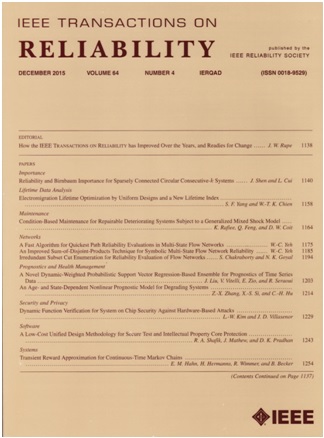基于q -学习的弱耦合信息物理电力系统弹性评估
IF 5.7
2区 计算机科学
Q1 COMPUTER SCIENCE, HARDWARE & ARCHITECTURE
引用次数: 0
摘要
网络物理电力系统(CPPS)从极端事件引起的级联故障中恢复和恢复故障前功能的能力是弹性研究的一个关键焦点。与大多数研究人员研究的强耦合系统不同,本文研究弱耦合CPPS,探索以结果为导向的恢复方法来增强系统弹性。根据弱连接CPPS在不同耦合模式下的弹性和故障转移概率,比较了各种修复方法。利用Q-learning算法,得到了网络恢复的优化序列,使故障对网络功能的负面影响最小化,同时降低了功率损失。通过对IEEE 39、IEEE 118和IEEE 300网络及其相应的无标度网络建立弱耦合CPPS的仿真实验,全面验证了所提方法的有效性和泛化性。通过单节点恢复和多节点恢复两种恢复机制验证了其合理性。通过与启发式恢复方法和基于优化的恢复方法的比较,我们发现该方法可以显著加快网络恢复速度,提高网络弹性,实现更好的弹性中心性。这些发现为CPPS恢复工作的决策提供了有价值的见解。本文章由计算机程序翻译,如有差异,请以英文原文为准。
Q-Learning-Based Resilience Assessment of Weakly Coupled Cyber-Physical Power Systems
The capability of cyber-physical power system (CPPS) to recover from cascading failures caused by extreme events and restore prefailure functionality is a critical focus in resilience research. In contrast to the strongly coupled systems studied by most researchers, this article examines weakly coupled CPPS, exploring result-oriented recovery approaches to enhance system resilience. Various repair methods are compared in terms of the resilience of weakly connected CPPS across different coupling modes and probabilities of failover. Utilizing the Q-learning algorithm, an optimized sequence for network restoration is obtained to minimize the negative influence of failures on network functionality while reducing power loss. The proposed method's effectiveness and generalizability have been comprehensively verified through simulation experiments by establishing weakly coupled CPPS for the IEEE 39, IEEE 118, and IEEE 300 networks and their corresponding scale-free networks. Its rationality was verified through two recovery mechanisms: single-node recovery and multinode recovery. By comparing the proposed method with heuristic recovery methods and optimization-based recovery methods, we found that it can significantly accelerate network recovery, and improve network resilience, achieving better resilience centrality. These findings provide valuable insights for decision making in CPPS recovery work.
求助全文
通过发布文献求助,成功后即可免费获取论文全文。
去求助
来源期刊

IEEE Transactions on Reliability
工程技术-工程:电子与电气
CiteScore
12.20
自引率
8.50%
发文量
153
审稿时长
7.5 months
期刊介绍:
IEEE Transactions on Reliability is a refereed journal for the reliability and allied disciplines including, but not limited to, maintainability, physics of failure, life testing, prognostics, design and manufacture for reliability, reliability for systems of systems, network availability, mission success, warranty, safety, and various measures of effectiveness. Topics eligible for publication range from hardware to software, from materials to systems, from consumer and industrial devices to manufacturing plants, from individual items to networks, from techniques for making things better to ways of predicting and measuring behavior in the field. As an engineering subject that supports new and existing technologies, we constantly expand into new areas of the assurance sciences.
 求助内容:
求助内容: 应助结果提醒方式:
应助结果提醒方式:


